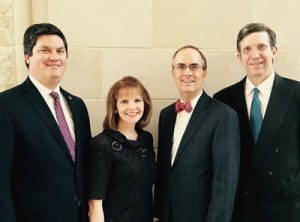Research partners in collaborative venture will help rapidly prototype new diagnostic and clinical treatment approaches

The Retina Foundation of the Southwest and SMU’s Bobby B. Lyle School of Engineering will collaborate to create the Clinical Center of Innovation for Age-Related Macular Degeneration.
Supported by a $2.5 million grant award from the W. W. Caruth, Jr. Foundation at Communities Foundation of Texas (CFT), the center will be housed at the Retina Foundation in Dallas.
The new collaborative venture will help to rapidly prototype new diagnostic and clinical treatment approaches, focusing on the specific needs of patients who are losing their vision to age-related macular degeneration.
Physician Karl Csaky, Chief Medical Director and T. Boone Pickens Senior Scientist at the Retina Foundation of the Southwest, will lead the joint venture, along with Marc Christensen, Dean of SMU’s Lyle School of Engineering.
Age-related macular degeneration is a progressive, degenerative disease of the retina and is the most common cause of vision loss for individuals 50 years and older. Currently, there are 18 million Americans who have some form of age-related macular degeneration.

It is projected that the population over the age of 60 will double by the year 2030, which will dramatically increase the number of individuals affected by this disease. At present there are few effective treatments for the majority of patients who suffer from age-related macular degeneration.
“I am extremely thankful to the Caruth Foundation for providing their generous support for a unique approach to help patients with age-related macular degeneration,” said Dr. Csaky. “This one of a kind initiative will focus on leveraging the strengths of two preeminent Dallas institutions.”
This $2.5 million award from the W. W. Caruth, Jr. Foundation at CFT recognizes the great need to develop an innovative approach to medical research for age-related macular degeneration, adapting new technologies and treatments that directly correlate to the patients’ disease state. “This type of unique partnership between a top engineering school and a clinical research organization has the potential to be replicated in other areas of medicine as well,” said Brent Christopher, President and CEO of Communities Foundation of Texas. “This model of pairing disparate disciplines to tackle challenging medical issues is the transformational approach Will Caruth would have championed.”
Since 1982, the Retina Foundation of the Southwest has been on the leading edge of basic research to better understand age-related macular degeneration and how it works to destroy central vision, which is necessary for reading, writing and driving. The Foundation also works closely with patients in a clinical setting to better understand the vision loss they are experiencing over time.
SMU’s Lyle School of Engineering is dedicated to the role of innovation in finding solutions to real-world problems and has a dedicated space for those pursuits – the Deason Innovation Gymnasium. The Lyle School will help to accelerate the clinical application of technologies.
“We are grateful for this opportunity to collaborate with Retina Foundation doctors to help develop and prototype treatments tailored to patient needs,” said Christensen. “For example, we’ll be in a position to tackle problems such as the delivery of medication to the retina through polymer chemistry and mechanical engineering. Engineering and medicine can partner in astounding ways, and we are excited to see how our framework for fostering innovation accelerates solutions to medical challenges.”
The opportunity presented by the W. W. Caruth, Jr. Foundation at CFT to collaborate with the Retina Foundation of the Southwest supports SMU and the Lyle School in the University’s commitment to increased research being advanced by the Second Century Campaign. — Kim Cobb
Click here and scroll down for information about the collaborative entities.
Follow SMUResearch.com on twitter at @smuresearch.
SMU is a nationally ranked private university in Dallas founded 100 years ago. Today, SMU enrolls nearly 11,000 students who benefit from the academic opportunities and international reach of seven degree-granting schools. For more information see www.smu.edu.
SMU has an uplink facility located on campus for live TV, radio, or online interviews. To speak with an SMU expert or book an SMU guest in the studio, call SMU News & Communications at 214-768-7650.

 Bitcoin scams steal at least $11 million in virtual deposits from unsuspecting customers
Bitcoin scams steal at least $11 million in virtual deposits from unsuspecting customers Teen girls report less sexual victimization after virtual reality assertiveness training
Teen girls report less sexual victimization after virtual reality assertiveness training Women who are told men desire women with larger bodies are happier with their weight
Women who are told men desire women with larger bodies are happier with their weight Fossil supervolcano in Italian Alps may answer deep mysteries around active supervolcanoes
Fossil supervolcano in Italian Alps may answer deep mysteries around active supervolcanoes